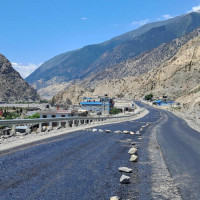- Sunday, 8 February 2026
Luring Digital Nomads
To attract digital nomads to Nepal, the government plans to introduce a digital nomad policy within a year. Digital nomads, referred to as individuals who work while travelling to different parts of the world, are growing in today’s globalised world. Until now, Nepal lacked such a policy-making; the government’s initiative is noteworthy. A policy catering to digital nomads is time-suited as they could help boost Nepal’s tourism, global visibility and economic growth at large.
As per the suggestions made by the High-Level Economic Reforms Recommendation Commission, the proposed policy aims to provide remote workers with a digital nomad visa along with other facilities like vehicle ownership. Similarly, the spouse of such a visa holder can also receive a visa. The visa will be a one-time, five-year multiple-entry visa. Regarding vehicles, they can purchase and register them. Foreign driving licenses will also be recognised for use in the country.
Digital nomads are considered eligible for the visa if they earn a monthly income of more than US$ 1,500 or a bank balance exceeding US$ 20,000. Also, they are required to have a health insurance policy of at least US$ 100,000 for treatment in Nepal’s hospitals. The projected policy also grants remote workers with digital nomad residential approval for at least a year at a time. They are also permitted to open bank accounts in Nepali commercial banks. In the case where their savings exceed US$ 50,000, they can transfer the additional amount to foreign banks at any time. Digital nomads can withdraw the entire balance from their Nepali bank accounts if the visa is not renewed after five years.
The digital nomad policy aims to collect an income tax of 5 per cent from digital nomads. Besides revenue generation, it can act fundamentally in giving a boost to the country’s tourism industry. Apart from spending their money within Nepal, they may also contribute to promoting the country among their relatives and friends abroad. It is reported that 66 countries around the world issue digital nomad visas. European countries such as Estonia and Spain are well-known for this owing to their favourable visa policies and provisions of eventual citizenship.
Nepal’s decision to propose this policy is appreciable as it can welcome more digital nomads into the country. Also, if managed well, Nepal can establish itself as a go-to destination for digital nomad communities from across the globe. For the policy to be more concrete, the government must hold productive dialogues with the private sector and other relevant stakeholders. More importantly, seeking opinions and perspectives from digital nomads and their association could enable Nepal to build a flexible policy.
For this initiative to succeed, the government will have to prioritise a constant electricity supply and high and reliable internet speed. Internet speed can be improved if the private sector is encouraged to cooperate and collaborate with the public internet service provider. Co-working spaces have to be established in adequate numbers to lure more digital nomads.
With the unmatched natural beauty, favourable weather and generally peaceful locations, Nepal can develop itself into a haven for digital nomads. Hence, international best practices have to be looked into to better design and execute the policy. A strategically devised policy is sure to welcome digital nomads while bringing spillover effects on the development of information and communication technology in the country.







-square-thumb.jpg)








